

The





 AIDAN CONNOLLY
AIDAN CONNOLLY
IFAMA President
IFAMA kicked off 2024 with a bang. The conference planning meetings for IFAMA 2024 World Conference in Almería, Spain are well underway, and indeed much of the program is firming up. We have more than 275 confirmed attendees representing 30 countries, and a record number of teams plan to travel to Almería to compete in the Student Case Competition. Since our conference in New Zealand, I’ve met with key IFAMA members in the US, China, Brazil, the Netherlands, Ireland, Austria — and visited another six countries. These meetings have put me in front of hundreds of agriculture professionals and allowed me to meet many of the movers and shakers addressing the critical issues in agriculture and our food systems.
Almería represents a unique opportunity for IFAMA. Its distinctive model has become
crucial to the food supply of the European Union, allowing the production of counter seasonal fruits, vegetables, and flowers for 600 million people throughout the continent. The challenges faced are real—water conservation, climate change, worker shortages, talent development and sustainability. These of course are not unique to Almería but reflect the challenges we face across our food production systems.
The big themes for the conference have emerged as expected: sustainability, digital disruption, the development of human capital in farming and agribusiness, reinventing the smallholder farm model, financial innovation and supporting leadership styles for complex business environments.
One of the anticipated sessions during the Business Forum is a panel discussion on successful ESG case studies. An IFAMR Special Issue, Sustainability as a winning strategy—the business case for ESG in the food and agribusiness sectors, will be published in two parts, underscoring the immense interest.
Next year, IFAMA 2025 will take place in Brazil, while IFAMA 2026 is earmarked for
Ireland. A clear indication of the organization’s flourishing state is the ongoing evaluation of proposals from six other potential host cities eager to welcome a future conference.
Our first two webinars in the new Food Matters series, chaired by the IFAMA Young Board, are posted on YouTube. The next webinar: Empowering farmers with better access to new information and innovation is coming up on April 25. These discussions show how IFAMA members are central to the important debates surrounding the food industry and the role agri can play in addressing the biggest issues in our industry.
As IFAMA continues to pave the way for sustainable agribusiness practices and nurture future leaders in the food and farming industries, the organization remains dedicated to driving positive change and innovation in the global agricultural sector. We hope you will join us in Almería for IFAMA 2024 and add your important perspectives to this collective experience.
Your President,
Aidan Connolly
aconnolly@agritechcapital.com
WhatsApp +18594943978


JACK KEEYS
Chair, IFAMA Young Board; j_keeys@outlook.co.nz
governance in battling the global climate crisis, with Damien McLoughlin, Juan Aguiriano and Mary Shelman. Moderated by Jack Keeys.

This year, the IFAMA Young Board is creating and consolidating the IFAMA regional Young Professional Networks around the world, and hosting events on each continent.
We’ve launched a series of thought-provoking podcasts. Ariana Torres from Purdue University (USA) delivered a practical two-part workshop: Top 10 Social Media Strategies Agribusinesses, to help for farmers, buyers, and distributors learn how to use online and social media marketing to boost profits.
The Food Matters Agri-Podcast Series launched in February featuring renowned thought leaders in food and agribusiness. Watch the following excellent and relevant recordings!
• The emerging role of corporate
• Harnessing the revolutionary power of AI across the global food system, with Sylvain Charlebois, Aidan Connolly, and Yoav Levsky. Moderated by Jessica Souto.
• Empowering farmers with better access to new information and innovation with Jack Bobo, Kellie Adesina, and Jayson Lusk. Moderated by Mateusz Ciasnocha.
In January, IFAMA hosted the first of Next Gen Ag Impact Network’s (NGIN) 2024 Leadership Sessions – Emerging Innovations and Their Applications for the Future of Food and Agriculture. Fifteen disruptive technologies and trends were introduced — artificial intelligence, blockchain and big data, wearable technologies, personalized nutrition, virtual and augmented reality, cellular agriculture, and vertical farming. NGIN Ambassadors discusses how these innovations create opportunities and challenges for global agriculture. Read a Lucy Chioma Aniagolu’s summary of the session .
The Young Board is accepting nominations for the 2024 Rising Star Award. We will honor a young professional who is breaking barriers in the food and agriculture sector during the 2024 World Conference in Almería. Nominate by 30-April. Learn how to nominate a candidate here.
The IFAMA Young Board has two exciting initiatives launching in 2024:
The IFAMA International Mentoring Program aims to connect young professionals with global mentors for a unique networking experience based on their goals, ambitions, and interests. More details will be provided during the IFAMA 2024 World Conference.
In October 2024, the Young Board will offer a global Venture Building Challenge, sponsored by Bayer Crop Science. This event is an opportunity for students and young professionals to showcase their talents in an international online challenge to develop a

commercialization strategy to take a scientific technology and/or business innovation to market. There will be global judges, cash prizes, and a world title up for grabs in its second year! Stay tuned for more information.
Young professionals/students who would like to serve on a regional committee of the Young Professional Network (anywhere worldwide), please reach out to me, and I will direct you to the lead person for your region.
IFAMA is introducing a new award which aims to recognize and celebrate the exceptional contributions of women who have displayed outstanding dedication and leadership in advancing the food and agribusiness sector.
How to cultivate connections and create opportunities at the IFAMA 2024 World Conference (even if you’re an introvert!)

Tuesday, 30-April 4–5pm UK Time (GMT+00:00)
Hosted by Michelle Marais Register here
Nominees must be a member of IFAMA and meet at least two of the following criteria:
• Showcased outstanding leadership and innovative solutions in agribusiness, driving positive impact on local and global agriculture.
• Advocated for the empowerment and education of women in agriculture through mentorship, training, or community programs.
• Implemented sustainable agricultural practices that contribute to environmental conservation and
community development.
• Contributed to the advancement of agricultural technology and digital solutions to enhance productivity and efficiency in the industry.
To nominate a candidate please submit a written statement that highlights the contributions and service made by this individual in at least two of these categories. Nominations should provide appropriate supporting evidence that is not contained in the candidate’s vita. The recipient(s) will be announced during the 2024 Presidential Awards Banquet in Almería, Spain.
Please submit nominations via email by Friday, May 17, 2024, to: Kathryn White, Head of IWAA Nomination Committee, ifama@ifama.org.

The IFAMA Young Board is hosting an International Speed Networking session during the IFAMA 2024 World Conference.
This session will turbo-connections among executives with more than 150 young professionals attending the conference. Companies have the opportunity to profile their brand, generate awareness, identify potential fits to fill job vacancies, and scout for emerging talent. Each executive will engage directly with a minimum of 15 targeted individuals who are interested in their business.
This session provides students and early-
career professionals an opportunity to meet selected executives and key representatives of global food and agribusiness organizations. It encourages international collaboration, provides unique career insights, and where relevant, identifies future job opportunities.
The event has 12 slots available for selected executives and key representatives of global food and agribusiness sectors, who will have an opportunity to participate in five 8-minute rotations with emerging talent—more than 150 attendees under age 35 are attending the conference—including members of the Student Case Competition, scholarship recipients, graduate students and early career professionals.
Executives must email their epressions of
interest by 20 May 2024, after which twelve executives will be selected to participate. For more information, contact IFAMA Young Board Chair, Jack Keeys: j_keeys@outlook. co.nz.


The Andalusia province, situated on the southeast coast of Spain, contains 32,000 hectares of greenhouses that are dispersed among 12,500 farms, operated by 15,000 farming families, which generate over 110,000 jobs (1). This high concentration of agriculture combined with several auxiliary industries, different sustainable agricultural technologies, and a research and innovation hub located near the cities of Almería and El Ejido led to IFAMA’s desire to host the 2024 World Conference in Almería. Conference attendees will have an opportunity to learn more about Almería’s unique model of economic growth in Europe, where agriculture is the primary driving force.
Today, greenhouse agriculture, the production and marketing of vegetables, and auxiliary agriculture industries account for almost 40% of Almería’s GDP (2). The region has set milestones around water conservation, quality certification, biological pest control, and organic production. This fact provides the foundation for the thematic discussions occurring during the IFAMA 2024 World Conference on innovation and sustainability.
IFAMA’s 2024 partner, the International School of Agribusiness Management (ISAM), located in Almería, contributes to educating and equipping the next generation of young professionals entering this sector—a sector that has undergone a real revolution in recent years.

The greenhouse complex that covers about 32,000 hectares (79 thousand acres; 125 square miles) in the province of Almería, Andaluicía, Spain, is visible from space.
Technology is central to the economic performance of agriculture in Almería. Plastic coverings, hybrid seeds, soilless crops, irrigation programs, and new greenhouse structures have been added without interruption,

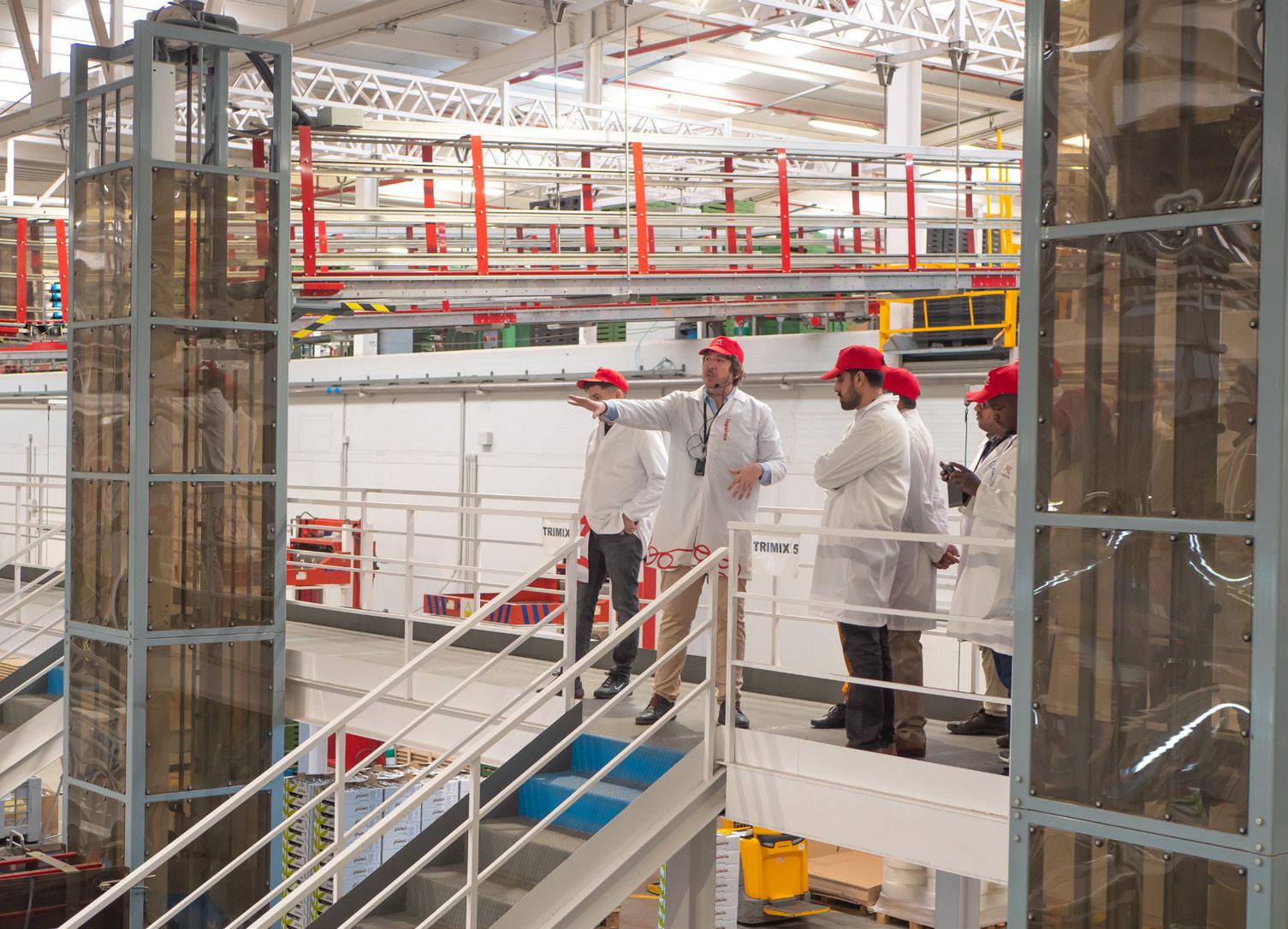
Cooperative companies unite local farmers, enhancing efficiency, reducing costs, and empowering communities. Their democratic ethos supports more than 70% of the region’s agricultural production.
making it possible to improve production in sustainable ways and ensuring the profitability of crops in competitive markets. Specifically, horticultural production has grown almost fivefold from 669,218 tons in 1975 to 3,823,359 tons in 2021 (including not only winter production) (3).
Almería is breaking fruit and vegetable export records because large European consumer countries such as Germany, the Netherlands, and the United Kingdom are looking for reliable suppliers that are capable of supplying supermarkets and retail chains with quality fruit and vegetables year-round.
The province of Almería is known for its warm, dry climate, with average annual temperatures ranging between 18–20º C (64–68º F). In addition to these favorable climatic conditions, Almería’s agrosystem has continued to innovate since 1963, when the first greenhouse was built.
Almería is actively addressing the challenge of feeding a growing world population—which is expected to reach 10 billion people by 2050 (4).
The intelligent use of finite natural resources in a sustainable way is another defining element of this fruit and vegetable production chain that is sustaining Europe. The sector minimizes waste and resource use. The greenhouse industry has made strides in sustainability and environmental responsibility by recycling 90% of the plastic waste it generates (5). The process of mechanical recycling gives plastics a second life whereby it is converted into pellets and granular plastic for repurposing into bags, bottles, furniture, textiles and clothing. Almería designer, Elena Funes uses the recyclables in her Agricostura clothing collection. Local architect Ana Cervilla transforms vegetable waste from greenhouse crops in Almería into materials for building construction.
Expanding the use of photovoltaic solar energy on greenhouse roofs has the potential to enhance the modernization of intensive agriculture. If greenhouses in southeastern Spain were equipped with solar panels, they could generate 31% of Spain’s energy needs (6).
Intensive agriculture in Almería has become a livelihood for the residents of the area, where associative or cooperative entities are developing, as

well as local trading companies closely linked to the production processes. Cooperatives and agricultural processing companies currently account for around 70% of fruit and vegetable sales in the country.
The equitable distribution of the territory also results in a wide and equal distribution of the provincial economy, generating few disparities in terms of income and welfare levels. Almería attracts individuals from all over the world, boosting the economy in rural areas at high risk of depopulation. According to data from the INE (National Statistics Institute), the percentage of the emigrant population registered in one of the producing provinces of south-eastern Spain in 2022 was 21.8%, with the national average being 11.6%.
Almería’s agricultural landscape in the next decade is expected to improve biodiversity both inside and outside the greenhouses, as farmers become more familiar with digital processes, more innovative, and more concerned about environmental sustainability.
Parallel to this progress, the sector faces major challenges (7) such as the new Food Chain Law; unfair competition from third countries; and a specific water policy that considers the area’s structural water deficit.
The new Law on the Food Chain is intended to be an administrative burden making it difficult to achieve and comply with the objectives pursued. The regulations are necessary to balance the chain, strengthen it, and give transparency and balance to the structure that links farmers with the food industry and distribution, but the weakest link continues to be the farmer and the production companies.
This has led to protests from the countryside, which are calling for the regulation to be improved “to prohibit unfair practices and for farmers’ prices to cover production costs”, according to the agricultural organizations.
Another of the most fiercely pursued demands is EU control over imports from third countries, which is why they are asking for the incorporation of mirror clauses so that they meet the same quality standards demanded of fruit and vegetable producers in the European Union.
The key for this area is a specific water policy due to the existing drought. This is a long-standing aspiration of the agricultural organizations, Research and development efforts in Almería ensure continuous refinement of products, contributing to sustainability and establishing the region as a beacon of innovation in agriculture.


associations and institutions in Andalusia and involves improving the impact of the new Common Agricultural Policy (CAP) on water management and the commitments of the administrations to speed up concessions and permits, as well as the progress of existing infrastructures and the efficiency of irrigation systems. These events will also be studied in the classrooms of ISAM (International School of Agri Management), for the purpose of supporting and contributing to the professionalization of the sector.
The IFAMA 2024 Conference is sparking enthusiasm in the Spanish province for the upcoming event. It is undoubtedly a privileged international opportunity to showcase the advances in innovation and sustainability and to share experiences, knowledge, and efficiency.
(1) Delegación en Almería de la Consejería de Agricultura, Pesca, Agua y Desarrollo Rural de la Junta de Andalucía (2024).
(2) Cajamar (2017): Análisis de la campaña hortofrutícola de Almería. Campaña 2016-2017. Almería: Fundación Cajamar.
(3) CEX (2021): Base de datos de comercio exterior (https://www.icex).
(4) DESA, Departamento de Asuntos Económicos y Sociales de la ONU (2019): Perspectivas de la Población Mundial.
(5) Juan Carlos Pérez Mesa, catedrático de la UAL vinculado al área de Economía y Empresa y codirector de la Cátedra COEXPHAL-UAL (2024).
(6) Pérez, M. y Sánchez, J. A. (2012): Energías renovables en los invernaderos. Cuadernos de Estudios Agroalimentarios, 3: 181–210.
(7) Prospectiva estratégica para el sector agroalimentario andaluz y extremeño. Informe de la Asociación de Empresarios del Sur de España, CESUR (2024).
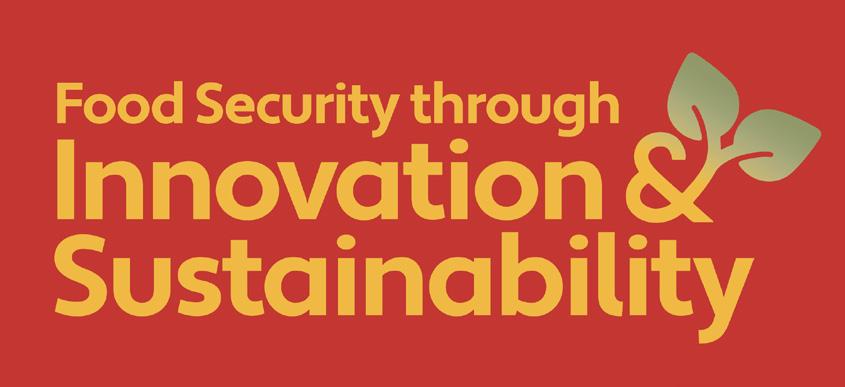
June 17–20 in Almería, Spain

A collaboration among stakeholders across multiple sectors is needed to transform agriculture combining innovation, science and technology. Will technology achieve its promise to transform food supply chains and farming?

The commercialization of climate-resilient and sustainable innovation from farm-to-fork is necessary to ensure a net-positive future. What are the economics of sustainability? Can ESG be aligned with sustainability of the food business?

Regulation plays a key role in promoting and enforcing sustainable practices in agriculture. Who should lead change? What role should governments, universities, consumers and corporations play as agents of disruption in the existing systems?

As the global population increases access to balanced diets is not equitable, leading to food scarcity in some regions, and food waste and an obesity epidemic in others. Can we create a better society through better food? How do we balance the needs for abundant food, nutrition, human health, with diminishing planetary resources?


TIn the dynamic landscape of agriculture, the seed industry is a cornerstone of innovation and sustainability. With its tireless pursuit of improved crop varieties, advanced breeding techniques, and environmentally friendly practices, the seed sector, as the starting point of the food system, plays a pivotal role in shaping the future of the agri-food sector.
he continuous development of locally adapted and potentially high-yielding, disease-resistant crop varieties is one of the seed industry’s most significant contributions. Through years of research and breeding efforts, seed companies have introduced crops that enhance yield and exhibit resilience against pests, diseases, and adverse environmental conditions, helping farmers adapt to the challenges of a changing climate. These advancements bolster farmers’ productivity and competitiveness and, importantly, contribute to global food security by ensuring a stable supply of nutritious crops.
The seed industry’s commitment to innovation extends beyond traditional breeding methods. With the advent of biotechnology, genetic engineering, and genomic technologies, seed companies can now accelerate the pace of crop improvement. Traits such as herbicide and drought tolerance or insect resistance can be precisely incorporated into crops, offering
farmers more efficient and sustainable means of cultivation. By harnessing the power of (bio)technologies, the seed industry contributes to the advancement of agriculture, enabling farmers to produce more with fewer resources while minimizing the environmental impact.
In addition to genetic advancements, the seed industry is at the forefront of promoting sustainable agricultural practices. Through smart farming, precision agriculture, high-tech closed growing systems (greenhouses), conservation tillage, and integrated pest management, seed companies empower farmers to adopt more resource-efficient and environmentally friendly farming methods. By optimizing inputs, minimizing waste, and reducing environmental degradation, these practices enhance the sustainability of farming operations and contribute to preserving natural resources for future generations.
Moreover, the seed industry plays a critical role in promoting biodiversity and preserving genetic diversity in crops. By maintaining extensive germplasm collections and supporting conservation efforts, seed companies ensure the availability of diverse genetic resources for current and future breeding programs. This biodiversity serves as a reservoir of valuable traits and strengthens the resilience of agricultural systems in the face of climate change and increasing pest and disease pressures.
Furthermore, the seed industry drives innovation in sustainable packaging and distribution practices. With a growing emphasis


Breeding a tomato that yields the desired combination of characteristics requires many years. Photo courtesy of Gautier Semences.
on reducing plastic waste and minimizing carbon emissions, seed companies are exploring alternative materials and transportation methods to reduce their environmental footprint. From biodegradable seed coatings to optimized supply chain logistics, these initiatives demonstrate the seed industry’s commitment to sustainability at every link of the value chain. Innovation also impacts the offering of new varieties that can become new ingredients for the food industry. It is remarkable how the seed industry can bring new concepts to the fresh produce chain, contributing to an increase in the added value of the full chain and the satisfaction of the end consumer.
The seed sector also has a key role in the evolution and transformation of agricultural production by serving as a key catalyst for collaboration among stakeholders across multiple sectors along the agri-food value
chain(s). Through its pursuit of innovation, science, and technology, the seed industry not only drives advancements in crop breeding and genetic improvement but also fosters partnerships with all types of farmers, researchers, policymakers, regulators, and industry leaders to develop sustainable solutions for the challenges facing modern agriculture.
The seed industry’s contribution to innovation and sustainability in the agri-food sector cannot be overstated. Through its pursuit of improved crop varieties, adoption of advanced breeding techniques, promotion of sustainable farming practices, and commitment to biodiversity conservation, the seed industry is committed to driving positive change and contributing to the sustainable transformation of agri-food systems.
As we confront the challenges of feeding a growing global population while safeguarding our planet’s resources, the seed industry’s leadership and creativity will continue to be instrumental in meeting the demands of the 21st-century agri-food sector.
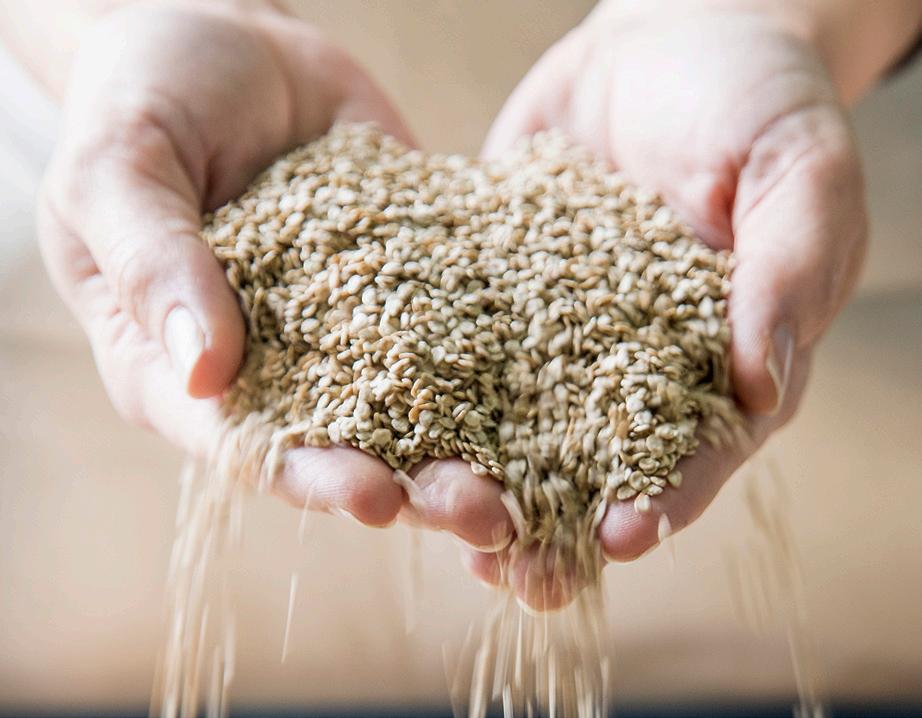
Producing seeds, such as these tomato seeds, is a profession of passion and expertise.
Photo courtesy of Gautier Semences.
This article is contributed by the International Seed Federation (ISF) with the support of Gautier Semences, Sakata Vegetables Europe, and Semillas Fitó. All are sponsors of the IFAMA 2024 Student Case Competition.

The International Seed Federation (ISF) and three of its member seed companies: Gautier Semences, Sakata Vegetables Europe and Semillas Fitó, are sponsoring the IFAMA 2024 Student Case Competition, to be held in El Ejido-Almería in June. The Case study will focus on elements related to Innovation & Sustainability, impacting different actors along the agrifood chains, with a specific focus on the seed sector’s contribution and challenges.

ISF is the voice of the global seed sector. Since 1924, it has represented the interests of its members who make up 96% of international seed trade today. Its global reach extends to seed associations and seed companies around the world, and it has official observer status in key intergovernmental and international organizations. ISF’s vision is a world where the best quality seed is accessible to all, supporting sustainable agriculture and food security. To fulfill that, ISF ‘s mission is to create the best environment for the global movement of seed, and promote plant breeding and innovation in seed.

Since its foundation in Japan in 1913, Sakata has contributed to improving global nutrition and sustainable agriculture around the world. Sakata combines ancestral know-how and continuous investment in R&D. Twenty percent of its employees across the world are research staff, and in EMEA (Europe, Middle East and Africa), eight research centers operate next to the main production areas. By working closely with its customers, Sakata will continue to create and supply high-quality vegetable varieties and seeds to address today’s and tomorrow’s challenges.

Gautier Semences is a French, family-owned and independent company, established in 1952. We are operating at an international level. Attentive to our customers and partners expectations, our way of working encourages personalized collaborations, bringing forward new ideas. Our constant commitment to R&D enables us to provide innovative solutions to sustainable agriculture’s challenges and support farmers with healthy, safe and efficient seeds, without compromising on quality and taste. The special care we take with taste has become our signature. Our ambition is to offer everyone the finest of nature: health, pleasure and responsibility.

Semillas Fitó is a multinational company established in the district of Sant Martí de Provençals, Barcelona, which was, at that time, one of the vegetables production areas of Barcelona. Having also an office in the central market of Barcelona, the company proved to be committed from its beginnings in 1880 to create sustainable wealth across the value chain. Today, it is one of the leading multinationals in the seed sector operating through subsidiaries and dealers in 4 continents around the world.

We have some fun and educational full or half day post-conference agri-tours planned for you. Learn how this region produces vast amounts of food with relatively little water and how it transformed the agriculture sector using innovative and sustainable growing methods. Agri-tour tickets available here.

Integrated Pest Management, R&D, Seeds & Cooperatives
Duration: 9:00–15:30
Cost: $100 USD

Koppert Biological.
Are you interested in seeing how nature’s own biological processes can be used to protect crops? Koppert will show how visitors how they manage pests and diseases through beneficial insects and
microorganisms to improve crop health, minimize chemical pesticides, and enhance ecosystem balance.
Bayer Vegetable Seeds R&D Center of Excellence will provide a tour of its cell biology laboratories, phytotrons, and a state-ofthe-art technological greenhouse. You will get a firsthand look at the production process of double haploid plants. Learn how this technology contributes to the efficiency and quality of vegetable breeding pipelines.
Lunch: Restaurante El Edén, 13:30
Beyond Seeds is a group of six biotechnology companies that provide cutting-edge products and services for the agri-food sector and the health sector. The headquarters and R&D center is located on the campus of the University of Almería. It has a technical production and logistics center an experimental station. UNICA is an integrative group of cooperative members that produce vegetables , leaf, melons, fruits and snacks for export. An integrated project aimed at improving your profitability, for all stakeholders.

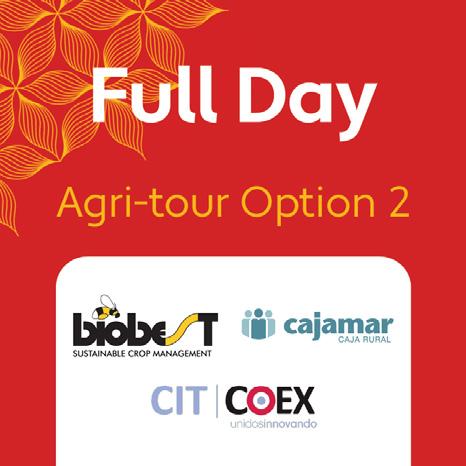
Innovating farming techniques utilizing integrated pest management to address climate change, water scarcity—sustainably
Duration: 9:00–15:00, Cost: $100 USD

Biobest , a pioneering company specializing in biological crop protections that provides natural alternatives to chemical pesticides. A greenhouse tour will show how beneficial insects like predatory mites and parasitoids control pests while preserving ecological balance and how Biobest uses bumblebees for efficient pollination. Biobest plays a crucial role in sustainable agriculture worldwide because of its focus on biodiversity and environmental stewardship.
Estación Experimental Las Palmerillas, operated by Cajamar, is a prominent agricultural research institution in Almería, Spain, featuring cutting-edge laboratories, greenhouses, and experimental fields. Researchers conduct comprehensive studies aimed at developing innovative farming techniques, improving crop varieties, and implementing sustainable agricultural practices. The center addresses pressing challenges, such as climate change, water scarcity, and pest management.
Lunch: Restaurante El Edén 13:30
CIT COEX . Innovation is a key component driving all R&D projects In the Technological Innovation Centre of COEXPHAL A tour of the Labcolor, in the COEXPHAL laboratory, will provide a look at its specialization in controlling pesticide residues, microbiology or food hygiene, phytopathology for the diagnosis of crop diseases and the agronomy area which analyses the parameters involved in plant nutrition to maximize production and quality.

Innovative greenhouse farming, irrigation, nursery, and salads
Duration: 10:30–15:30
Cost: $100 USD

Novagric’s advanced agricultural technology includes precision farming tools, automation technologies, and biotech innovations aimed to enhance productivity and sustainability. Key ferti-irrigation systems. Through leveraging real-time data analytics and cutting-edge technologies, Novagric is able to empower farmers so they can make informed decisions, thus optimize resources while minimizing environmental impact.

Lunch: Location TBA
Primaflor is a company born in Almería. It is a leading producer and the main provider of salads for McDonald’s in Europe. During this visit, you will get to see the manufacturing facility for their salad brand “Mimaflor”, the nursery of pak choi. Primaflor strives to deliver premium produce and minimize its environmental impact. Through continuous R&D, the company remains at the forefront of the agricultural industry, meeting consumer demands for excellence and freshness.


Seeds and Technology
Duration: 9:00–14:00, Cost: $64 USD
Sakata Seed Corporation specializes in developing high-performance seeds for vegetables, flowers, and ornamental plants.
During this visit, we will visit their Research Center, where you will learn about seed improvement and seed extraction while you visit their labs and experimental fields.
Tecnova specializes in horticulture, agricultural technology, and sustainable farming practices. See its cutting edge laboratories, greenhouses, and experimental fields. Tecnova conducts pioneering research to develop resilient crop varieties, optimize irrigation techniques, and explore precision agriculture solutions.
Research, Seeds and Biostimulants
Duration: 9:00–12:30, Cost: $64 USD

The Bayer Vegetable Seeds R&D Center of Excellence in San Nicolas stands as a beacon of innovation in agricultural science. Their R&D teams work around the globe to enhance productivity on the farm and drive logistical solutions throughout the entire value chain. In this tour, you will see cell biology laboratories, phytotrons and a state-of-the-art technological greenhouse. See the production process of double haploid plants and learn about benefits that this technology brings to the efficiency and quality of vegetable breeding pipelines, with an ultimate goal of ensuring that more people have access to tasty and nutrientrich fresh vegetable produce.

Biorizon Biotech develops biostimulants and biopesticide products for agriculture based on microalgae, bacteria and plant extracts. Their first international commercial biostimulants based on microalgae, is ALGAFERT®. Its evolution in recent years has positioned it as one of the international benchmarks in the auxiliary industry in sustainable agriculture.

Professor Mzuyanda Christian, known to his friends and villagers as “George,” earned his PhD in Agricultural Economics from the University of Fort Hare (Alice, South Africa) in 2017, and became one of the youngest professors in South Africa at age 34. He is currently an Associate Professor in the School of Agricultural Sciences at the University of Mpumalanga, where he teaches agribusiness and agricultural policy. He has lectured and/ or conducted research at Tshwane University of Technology, Northwest University, Nelson Mandela University, and the University of Pretoria. Previously, Dr. Christian was a junior economist at the Department of Agriculture, Forestry and Fisheries (DAFF), and as an external examiner for UNISA, TUT, and UP since 2020. He also serves as a chairperson on academic advisory committees at different institutions of higher learning in South Africa.
Dr. Christian’s first introduction to IFAMA came in 2014 when he attended the IFAMA
2014 World Conference in Cape Town, South Africa and competed in the Student Case Competition. He has attended several conferences, including the IFAMA 2021 Virtual Conference, IFAMA 2022 Costa Rica World Conference, and he intends to present three papers during the Academic Symposium at IFAMA 2024 World Conference in June.
“IFAMA helped me to understand agribusiness innovations and motivated me to improve my educational qualifications and skills in order to tackle agribusiness challenges,” said Christian. “Consequently, I completed my MBA and started my own agribusiness consulting firm,” he said.

In addition to teaching, Dr. Christian mentors both undergraduate and postgraduate agribusiness management students and he coaches teams who are competing in the Student Case Competitions.
“As an agribusiness and policy educator, one of the most pressing challenges I see in our sector is attracting the next generation of

young people into the field of agriculture. Inefficiencies, corruption, and the ongoing geopolitical uncertainty contribute to this challenge,” Christian said.

Five-years ago, Christian started the Dr Christian Foundation which aims to empower and care for rural communities where basic needs such as school uniforms are a luxury. The Foundation has donated school uniforms, sanitary towels, and basic learning materials to more than 300 students, and it conducted online and in-person career expos for rural communities that were attended by over 2000 grade-12 students. Additionally, Dr. Christian and his team helped 150 students from deep-rural areas complete the enrollment forms and paid the application fees when needed for them to attend school.
“I believe every individual deserves an equal opportunity regardless of his or her background. The right to an education is a basic right for every child in South Africa,” Christian said, emphasizing the importance of education for all.
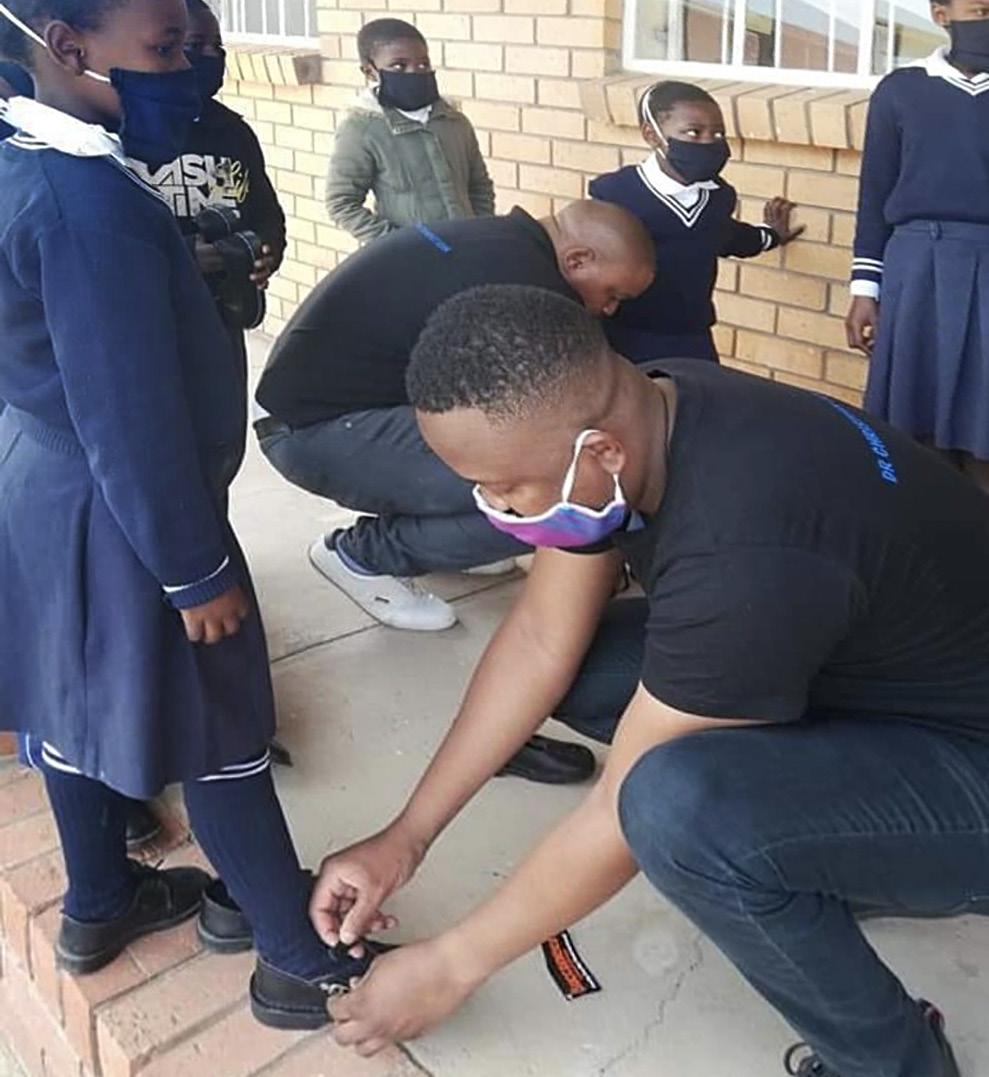



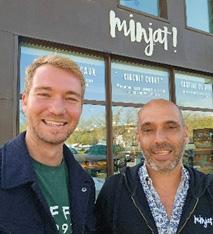
Afew weeks ago I sat in an Auckland apartment speaking over the phone with a French man in Toulouse. I spoke zero French, and I don’t think the man enjoyed speaking English (especially with a strange Kiwi, on a poor connection, who had cold-called him to ask for a visit). However, by the end of the conversation, I was 70% sure I’d convinced him to let me tour his business.
One month later I hopped from a bus on the other side of the world and strolled to the Minjat headquarters, where the founder, David Pages, greeted me at the entrance. He gave me a full tour and explanation of the business, sharing the challenges and opportunities Minjat offers in its fascinating but simple system.
Minjat is an integrated supermarket, butcher,
cheesery, bakery, online grocer, and restaurant, all located on the same premises. The supermarket includes fresh produce, locally processed and packaged food products, a refillery, ready-to-eat meals, and of course (being French) – a great selection of local wines.
The campus maximizes convenience and ensurs a shopper can meet all of their grocery needs from one location. This avoids a trap that many local food markets often fall into—becoming a niche provider where customers just top-up alongside their regular supermarket shop.
A minimum of 90% of the products sold at Minjat during any given season are procured from 400 suppliers all within a 150km radius of the store. The system connects these producers with local customers and consumers, while providing direct and indirect employment opportunities for those across the community.
A short supply chain with strong vertical integration means that Minjat is almost always able to pay higher prices to its producers than the larger chains. And producers are paid within one week of supplying the business (compared with up to two-months at the large chains).
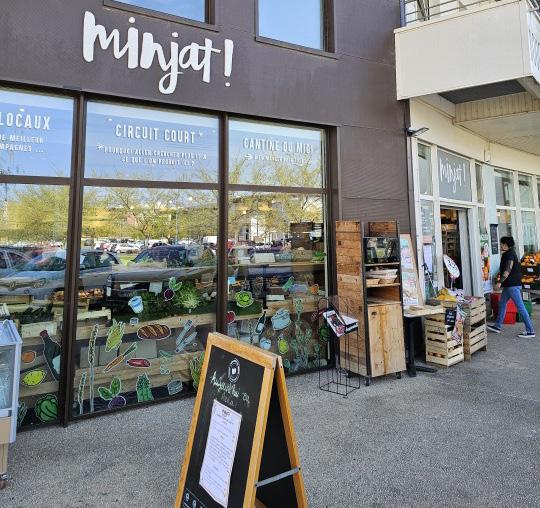



The business procures processed products from artisan producers who are within the 150km radius, providing a pathway to market that is at an appropriate scale for small businesses.
And consumers? With such a short valuechain, Minjat not only offers higher prices to producers, but lower prices to customers – in a business model that thrives on efficiency rather than scale to benefit all of those involved.
Most of the fresh fruit and veggies offered in Minjat follows the traditional seasonal production. Pickling, fermenting, freezing and other processing extends their availability across the year. A dynamic on-site restaurant caters to 50–100 people per day, using fresh produce and anything in oversupply, ensuring the entire store has less than 1% food wastage.

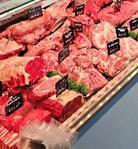
Minjat hosts special events such as creating 85 Irish Stews for St. Patrick’s Day, and hosting a community juice pressing event. They also host ‘producer’ days where farmers, growers and customers interact, ask questions, share recipes and engage at an interpersonal level to create a circular feedback loop and connect people at both ends of the supply chain.
The business provides employment to over 30 local members of the community, from part-time students to full-time executives.
David and his team have been growing the business from a concept six years ago, to today’s agile and integrated partnership business. The system works, but it isn’t easy. Some of the key bottlenecks or hurdles to scaling the model include:
• Executive knowledge and relationships in grocery, food processing, and food production.
• Access to skills and talent for all the critical roles within the business.
• A region with diverse production systems located within close proximity.
However, there are several locations which can tick these boxes in regions across France, New Zealand, and other countries. David and his team plan to scale this business model and its proven success within the region, to adjacent areas in the South of France, and then potentially across international borders in the future.
The intention isn’t to scale a centralized business and create yet another supermarket chain, but to empower the implementation of individual and independent successful systems each with its local adjustments for different communities. This way future Minjat stores can still benefit from the experience gained, but also retain an authentic hyper-local approach.
Find out more about the MINJAT business on LinkedIn, Facebook , Instagram, and their website.
by JACK KEEYS Managing Director, J Keeys Consulting & Zoffee Ltd.
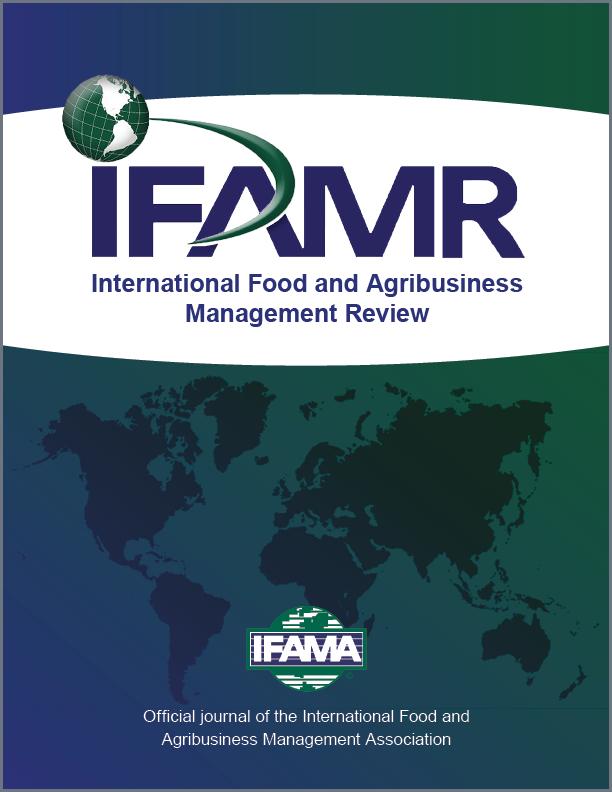
The International Food Agribusiness and Management Review (IFAMR) is seeking new Managing Editors to add to our team specifically from Africa, East and South East Asia.
The IFAMR is the flagship journal of the field of agribusiness, providing an intellectual meeting place to discuss, define, and advance the field of agribusiness.
Managing Editors act as agents in assisting authors to perfect their scholarship and help them to achieve the maximal impact from their work. The Review is an international journal welcoming reviewers, editors, and manuscripts from around the world.
1) Responsible for the double-blind peer review process of one manuscript a month, on average.
2) Suggest reviewers to the Administrative Editor for a particular manuscript or the Business Office will provide a list of potential reviewers.
3) Help attract submissions, promote the journal among your relevant community, identify new reviewers, and solicit Special Issues.
4) Work with reviewers to ensure that reviews are timely and of high quality. We expect the first reviews to be completed and returned to authors within 90 days of submission.
5) Review the paper, summarize the manuscript reviews, provide the author with direction and counsel, and render an opinion about the quality and readiness for publication of the manuscript.
6) Attend the annual IFAMA World Conference if possible to meet and collaborate with other attending IFAMR Managing Editors.
7) IFAMA provides complimentary annual membership for all Managing Editors in appreciation of your contribution to the journal.
8) Managing Editors are encouraged to advise how best to develop the journal and invite new contributors for the journal who wish to play an active editorial role.
Year-to-year, upon discussion with the Executive Editor. Managing Editor appointments are renewable by mutual agreement.
Please email a current copy of your CV to ifamr@ifama.org.


 KEVIN CHEN IFAMR Editor-in-Chief ifamroeic@zju.edu.cn
KEVIN CHEN IFAMR Editor-in-Chief ifamroeic@zju.edu.cn
IFAMR Office of Editor-in-Chief (IFAMR OEIC) is now rewarding the annual best paper to encourage and recognize excellent scholarship published in the journal. Ten candidates for the 2023 Best Paper Awards have been nominated by IFAMR OEIC among papers published in
The International Food and Agribusiness Management Review (IFAMR) is an internationally recognized catalyst for discussion on issues related to the global food and agribusiness system. From 2022 to 2023, authors and referees contributing to IFAMR have covered about 50 countries/regions. With the continuous support of our contributors, global editorial team, and so forth, IFAMR has enjoyed a steady impact increase. The journal’s IF is now 1.5 and ranks in Q3 of the Agricultural Economics & Policy category (Clarivate, 2023). The CiteScore is 2.9 and IFAMR is ranked 185/436 in the Business and International Management (Scopus, 2023).

Volume 25, 2022. Voting for the award rests with a review committee composed of the Editor in Chief, Chair of the IFAMR Advisory Board, and Managing Editors of the listed papers. The review criteria for the best paper
include Originality, Significance, Methodology, and Writing.
The manuscript Consumers’ perceptions and behavior toward food waste across countries authored by Yan Heng (University of Florida) and Lisa House (University of Florida) stands out as the 2023 Best Paper. The winner of the Best Paper Award will obtain an honored certificate and a fee waiver chance for a new IFAMR article. The 2023 Best Paper was managed by IFAMR managing editor Alessio Cavicchi (University of Macerata).
Food waste has become a global issue that has received increased attention in the past decade. Food waste at the consumer level is currently a major source of food loss in developed countries. Understanding consumers’ food waste-related behaviors and identifing key influences to control food waste in households are very important to improve sustainability in the food system. While recent research lacks comparison of food waste behavior across countries and regions, this

study contributes to the literature by providing a comprehensive investigation on consumers’ food waste related behaviors across countries focusing on fresh fruit and vegetables using novel multi-country data. See the full text in IFAMR Volume 25, Issue 2.
For authors whose papers have been accepted to present during the 2024 Symposium, the SI Editors are extending the deadline for academic track submissions to publish in the International Food and Agribusiness Management Review until 29 July, 2024. This allows authors to get additional feedback from colleagues and the Editors during the Symposium.
For questions related to submissions:
Publisher: BRILL Publishers
Leiden, The Netherlands
Email: Marc Jarmuszewski: marc.jarmuszewski@brill.com
For questions to the Editor-in-Chief:
Office of Editor-in-Chief
Zhejiang University
Hangzhou, Zhejiang, China PRC
Email: ifamroeic@zju.edu.cn
Editorial Coordinator: Prof. Rui Mao
Editorial Assistant: Yunyi Zhou

When you have a big moment in your career, email ifama@ifama.org with your name, location, and a brief mention of your newsworthy event so we can celebrate with you in our next newsletter.
Examples include: a promotion, the initiation or completion a project/ initiative, securing funding/grant, publishing an article/book, speaking at an event, winning an award or other recognition, competing in a challenge, or volunteering in career-centric role.
Join your regional WhatsApp chat group to share information on events, projects, research, or hot topics relevant to your region. Connect with students, young professionals, and experts. Ask a question, or find a collaborator for a business venture or research study.
The chat groups are open to current IFAMA members. If you would like to join the chat group in your region, simply email mara@ifama.org. Be sure to mention your region.

